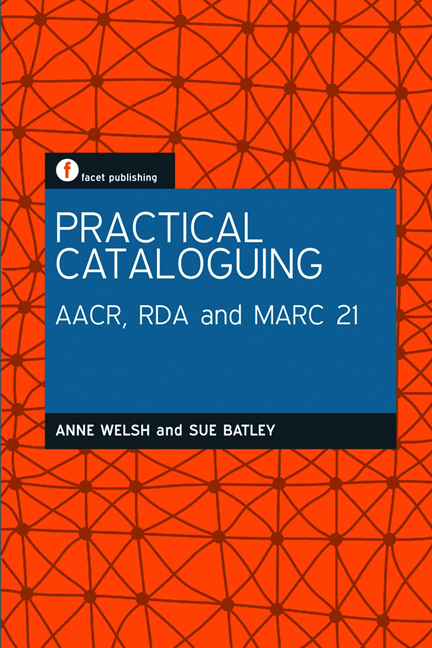Book contents
- Frontmatter
- Dedication
- Contents
- Acknowledgements
- Preface
- 1 Catalogues and cataloguing standards
- 2 The FRBRization of the catalogue
- 3 Bibliographic elements
- 4 Access points and headings
- 5 RDA: resource description and access
- 6 AACR and RDA
- 7 MARC 21
- 8 Practical cataloguing: bringing it all together
- 9 The birth of RDA and the death of MARC?
- 10 Examples
- References
- Index
1 - Catalogues and cataloguing standards
Published online by Cambridge University Press: 08 June 2018
- Frontmatter
- Dedication
- Contents
- Acknowledgements
- Preface
- 1 Catalogues and cataloguing standards
- 2 The FRBRization of the catalogue
- 3 Bibliographic elements
- 4 Access points and headings
- 5 RDA: resource description and access
- 6 AACR and RDA
- 7 MARC 21
- 8 Practical cataloguing: bringing it all together
- 9 The birth of RDA and the death of MARC?
- 10 Examples
- References
- Index
Summary
Catalogue. 1. (Noun) A list of books, maps or other items, arranged in some definite order. It records, describes and indexes (usually completely) the resources of a collection, a library or a group of libraries. To be distinguished from (i) a list, which may or may not be in any particular order and may be incomplete, and (ii) a bibliography, which may or may not be confined to any one collection of books or to a particular group of libraries. Each entry bears details of class number or call number to enable the item to be found, as well as sufficient details… to identify and describe the book. 2. (Verb) To compile a list of documents according to a set of rules so as to enable the consulter to know what items are available and… where they may be found.
(Prytherch, 1995)This working definition from a standard glossary of library terms encompasses in broad brush the focus of this book, which is to outline general cataloguing principles and highlight the major rules through which those principles are commonly applied within library collections.
In 2011/12 library cataloguing is in a state of flux as a new international cataloguing standard, Resource Description and Access (RDA), is developed and introduced (Joint Steering Committee for the Development of RDA, 2011). Widespread consultation and discussion underpins this committeedeveloped standard, and cataloguers and library managers await with interest each draft, toolkit and, eventually, implementation guidance.
At times like this, it is more important than ever that cataloguers should understand the general principles for providing information to their users, in order, ultimately, to decide on local cataloguing policy for their libraries. In this introductory chapter, we will consider the roots of general cataloguing principles and briefly survey the history of the development of the codes that are in use today.
Ranganathan
For many librarians, Ranganathan's Five Laws form the basic principles of librarianship:
• Books are for use.
• Every book its reader.
• Every reader his book.
• Save the time of the reader.
• A library is a growing organism.
- Type
- Chapter
- Information
- Practical CataloguingAACR, RDA and MARC 21, pp. 1 - 6Publisher: FacetPrint publication year: 2012



